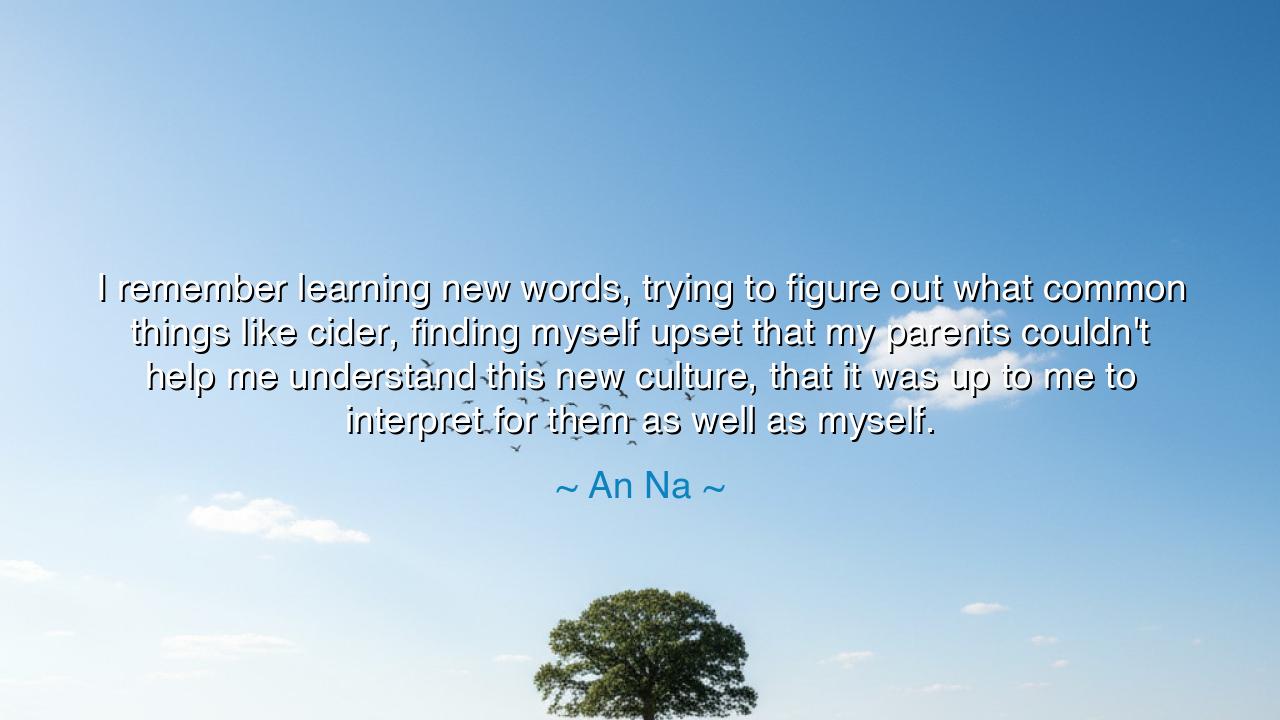
I remember learning new words, trying to figure out what common
I remember learning new words, trying to figure out what common things like cider, finding myself upset that my parents couldn't help me understand this new culture, that it was up to me to interpret for them as well as myself.






The words of An Na—“I remember learning new words, trying to figure out what common things like cider, finding myself upset that my parents couldn't help me understand this new culture, that it was up to me to interpret for them as well as myself.”—speak to the silent and tender struggle of identity, belonging, and language. They are the voice of one caught between two worlds: the world of origin, rich with heritage and memory, and the world of arrival, strange and unyielding, demanding interpretation. In these few sentences lies the story of countless souls who have walked the path of migration, who have become bridges between generations, carrying on their small shoulders the weight of two civilizations.
The origin of this quote comes from An Na’s personal reflections on her experience as a Korean American immigrant. In her youth, she found herself not only learning English but also learning how to exist within a culture her parents could not yet understand. This role—of interpreter, of mediator—became both a source of pride and pain. Her words capture the ache of every child who must grow up too soon, who must teach their parents the very language of the land that often looks upon them as outsiders. It is the sorrow and nobility of the in-between generation, those who translate not only words but emotions, customs, and dreams across the boundaries of nations.
To the ancients, language was sacred. They believed it shaped the soul. Confucius once said, “If names are not correct, language is not in accordance with the truth of things.” An Na’s struggle to understand “common things like cider” is not merely linguistic—it is existential. To learn a new word is to grasp a new reality, to step into a new way of seeing. Yet when no elder can explain it, the soul feels unmoored, suspended between knowing and not knowing. In such moments, a child becomes the teacher, the parent becomes the student, and the circle of knowledge is painfully reversed.
This reversal is not unique to her story. History is filled with children who have borne the torch of understanding for their families. Consider the immigrant children of Ellis Island in the early 20th century—Italian, Jewish, Irish, and Polish—standing as translators between their parents and a foreign world. They negotiated rent, interpreted doctors’ words, read government papers aloud. Their parents brought wisdom and sacrifice, but the children carried the keys to survival in a new tongue. They too must have felt what An Na describes: the burden of explaining the simplest things, the humiliation of confusion, and the quiet realization that growing up meant not only learning for oneself, but learning on behalf of others.
Yet within this struggle, there is also a deep and sacred strength. The child who bridges two worlds becomes, in time, a keeper of both. Such individuals learn empathy from an early age, for they must see through two sets of eyes—theirs and their parents’. They become interpreters of humanity itself, skilled in the art of translation beyond words: the translation of emotion, custom, and heart. An Na’s reflection reminds us that this task, though born of hardship, is also a calling. It forges resilience, creativity, and the ability to find meaning in spaces where none seems to exist.
Her words also unveil a universal truth: that all human beings, at some point, must learn to interpret their world. Whether one is an immigrant or not, each person is born into a culture they did not create, with rules they must decipher and names they must make their own. To live consciously is to constantly translate life into understanding, to take the unknown and render it familiar. An Na’s story, therefore, becomes a mirror for us all—a reminder that we are each, in our way, travelers across the landscapes of meaning.
The lesson, then, is one of compassion and patience—for oneself, and for those who walk beside us on the road of discovery. For the immigrant child, the artist, the seeker, and the stranger, the journey of interpretation is long and often lonely. But let it be remembered that from this struggle comes wisdom, and from this duality comes depth. The one who has lived between worlds becomes a vessel of connection, able to understand the language of both sorrow and joy.
So let us honor An Na’s words not as lament, but as teaching. Let us embrace our roles as interpreters—of cultures, of generations, of hearts. When the world feels foreign, may we find courage in curiosity; when words fail us, may we listen with the soul. For in learning to interpret for others, as An Na once did, we learn the greatest act of all: to bridge the distances between human hearts and become whole through understanding.






AAdministratorAdministrator
Welcome, honored guests. Please leave a comment, we will respond soon